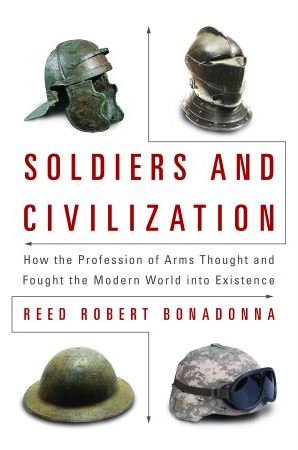Soldiers and Civilization examines the history of the military profession in the Western World from the ancient Greeks to the present day. Drawing from military history, sociology, and other disciplines, it goes beyond traditional insights to consider the military profession in the context of both literary and cultural history.

Bonadonna acknowledges the contradictory character of warfare and soldiering that Clausewitz recognized, writing, “The soldier is both the least civilized and the most civilized of persons.
Soldiers walk the weird wall at the edge of civilization, but they are prepared to serve their civilization and society without stint or limit … soldiers are constantly in danger of forsaking that which they serve and of forgetting the nature of what they do.”
Bonadonna, whose doctoral degree is in English literature, approaches his examination of the nature of war from a broad cultural and social perspective emphasizing the liberal arts, not merely history. He maintains that soldiers have made an unacknowledged contribution to the theory and practice of civilization, and that they will again be called upon to do so in important ways.
The reciprocal links between war and civilization are direct in the classical age and overwhelmingly documented. Greek city-states and the Roman Republic depended on armed citizens to protect their interests. Soldiering was a civic responsibility, formalizing the relationship between the state and individuals. It is hard to argue that military activity did not help to shape Greek society.
No one disputes that the growth and development of warfare have been functions in the advance of civilization, but the contributions of war to human progress may be less obvious. Many argue that violent conflict reflects little more than relentless cruelty and ruthlessness, manifesting the worst aspects of human nature.
War is paradoxical, ironic and ambiguous, all characteristics that defy traditional analysis. History has shown, however, that society and the military profession have been able to reconcile this tension within the context of cultural history and the liberal arts. Poetry can describe and evaluate war far better than science and objective metrics, precisely because poetry and war both are stochastic and embrace contradiction.
The author’s eclectic method is revealing. Nearly everyone interested in civilization recognizes that poetry and literature, art, music, and rhetoric as well as the sciences have influenced society. What may not be so clear is that war has been a pervasive subject of the liberal arts, creating a wide avenue of influence that has propelled culture and enlightenment forward.
Bonadonna also traces the growth of the military as a legitimate profession, once again derivative from previous work, most notably Huntington’s seminal The Soldier and the State (Belknap, 1957), although he casts a far larger historical and cultural net for his analysis than his precursor. He argues that the military profession, in its broadest consideration, might be viewed as an interdisciplinary branch of the humanities. A soldier is made of the words of history, poetry, and the laws and language of his calling. With each new conflict, the military may be called upon to preserve the values of civilization.
To fulfil its future role, Bonadonna argues that the military professionals of today must know, heed, and apply the examples and narratives of the most successful and exemplary military professionals of the past at their best.
Bonadonna, a recently retired director of ethics and character development at the United States Merchant Marine Academy and a retired Marine Reserve colonel, presents a scholarly but approachable and persuasive rejoinder that affirms warfare’s reciprocal positive contributions to progress.
Soldiers and Civilization is rich in content that summarizes military history from an interesting vantage point, not as a defence or rationalization for warfare, but instead by accepting conflict as integral to human nature and seeking greater understanding of what appears to be unavoidable behaviour.
Bonadonna explains the connection between professional militaries and the people in whose name those militaries fight and serve. Bonadonna reminds us not only that civilization has depended on soldiers, but also that our soldiers depend on their fellow citizens to understand, value, and help preserve their professionalism. The comprehensive nature of the book and the extent to which Bonadonna draws on the disciplines of the humanities to make his points set this volume apart from others on the subject.
Contact Marcus Fielding about this article.






